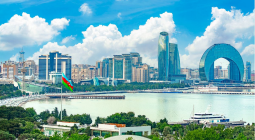Why we need to keep climate COPs inclusive
Frustration at slow progress towards the Paris Agreement goals is prompting calls to streamline the COP process – but restricting participation is the wrong response
As we approach the latest UN climate summit, COP29, we find ourselves once more demanding faster progress, greater ambition and redoubled commitments from governments to meet the urgency of the climate crisis. We also, once more, face calls for the COP process to be reformed and participation curtailed.
These calls are partly a response to COP28, held in Dubai last year, which was attended by 83,884 people – indeed an exception. More delegates means, for example, that negotiating rooms are fuller, compromising participation for some who are deeply engaged in the process. The growing pressure to reform COPs is also partly an expression of frustration with the process and with slow advances over many years on solving the world’s most pressing environmental crisis.
Not just governments
But suggestions that COPs should become more exclusive, or less frequent, or that negotiations should be separated from civil society participation, are misguided. It is essential that the COPs continue to be transparent and inclusive, especially for Global South governments and civil society, if they are to build the broad-based support we need to transition to a net-zero world.
Each COP – or Conference of the Parties to the UN Framework Convention on Climate Change (UNFCCC), to give the full title – is, as the name suggests, an intergovernmental negotiation. However, the COPs have evolved over time to become much more than that, reflecting the perspectives and needs of a much wider range of stakeholders.
An important development in that direction took place almost 10 years ago, at COP20 in Lima, where I served as COP president. There, we launched the Lima-Paris Action Agenda, to bring non-state actors – cities, business, NGOs, Indigenous communities – into the COP process. It allowed them to organise, define targets and actions, and create campaigns within the formal machinery of the COP.
This Action Agenda has given non-state actors a role – alongside the UNFCCC Secretariat and the Climate Champions appointed by COP host countries – in supporting the climate ambition of governments. It has spawned initiatives such as the Race to Zero, Race to Resilience and the Sharm-El-Sheikh Adaptation Agenda.
Five rings of negotiations
I see the COPs as operating in five ‘rings’ – which are concentric, influence each other, but allow different constituencies to operate and make their voices heard.
The innermost ring is the most important: the negotiations themselves. This is the forum in which decisions are made, in the context of mandates set by preceding COPs. For COP29, these include the New Collective Quantified Goal for finance, the Global Goal for Adaptation, implementation of the UAE Consensus, and the new cycle of national climate plans (or Nationally Determined Contributions, NDCs). These processes must be transparent and accountable to the global public.
The second ring is formed of the high-level thematic events, organised by the presidency of each COP. These events – such as those on health, fresh water, and climate and nature held in Dubai – take place outside the negotiations, but can help initiate processes that inform future negotiations and create political momentum.
The third ring comprises the Action Agenda, as discussed above. The fourth ring is often dismissed as a mere trade fair, but the pavilions at COP provide a place for business, NGOs, Indigenous Peoples, academia and other stakeholders to meet, share ideas and create new partnerships. New ideas and concepts are launched, contested, and sink or swim – which can have a profound impact on global debates throughout the year and all over the world.
Finally, the fifth ring is that of bilateral and plurilateral relations between key state actors, which is a vital connective point to advance decision-making on key climate issues.
Balanced and equitable participation
These five rings depend on the participation of many thousands of people. Making the process more efficient by reducing participation of key actors will undermine the collective nature of the climate negotiations.
This is a multilateral process in which every voice, not just those of governments, must be heard, through a bottom-up, democratic set of interlinked discussions at many levels. We recognize the need for balanced and equitable participation – especially from the Global South – and the need to limit the influence of fossil fuel and other corporate lobbies aimed at inhibiting rapid progress towards climate goals. But neither of these necessarily means less people overall participating in COPs – although there can be logistical difficulties in managing large conferences.
The annual climate summits must also be as accessible as possible, including to participants from least-developed countries and marginalised communities, who may not have the resources to readily travel to the talks. Host governments have a role to play, whether by financially supporting participation from those who can least afford it, or by capping the costs that hotels and service providers charge delegates. Some recent COPs have been characterised by rampant profiteering and price–gouging, with hotels dramatically increasing their rates to take advantage of delegates.
The real cause of sluggish progress
Some critics of the COP process have blamed the high numbers of attendees for slow progress in the process. That blame is misdirected. The real culprits are governments around the world that have not set ambitious targets or are not doing enough to reach the targets they have committed to – and the entrenched polluting interests that undermine political will and commitments to strong climate action.
Proposals for reducing participation at COPs are a distraction from the main task at hand: finding mechanisms that make NDCs more ambitious, and targets within them more enforceable. Without that, we will not have a multilateral process that is equal to the climate emergency that we face, no matter how many people are in the room.
Cover photo: Delegates negotiate in a huddle during informal consultations on the Warsaw International Mechanism for Loss and Damage at the COP28 climate summit in Dubai, UAE, on December 10, 2023. (Photo by IISD/ENB | Mike Muzurakis) Delegates negotiating in a huddle during informal consultations on the Warsaw International Mechanism for Loss and Damage



